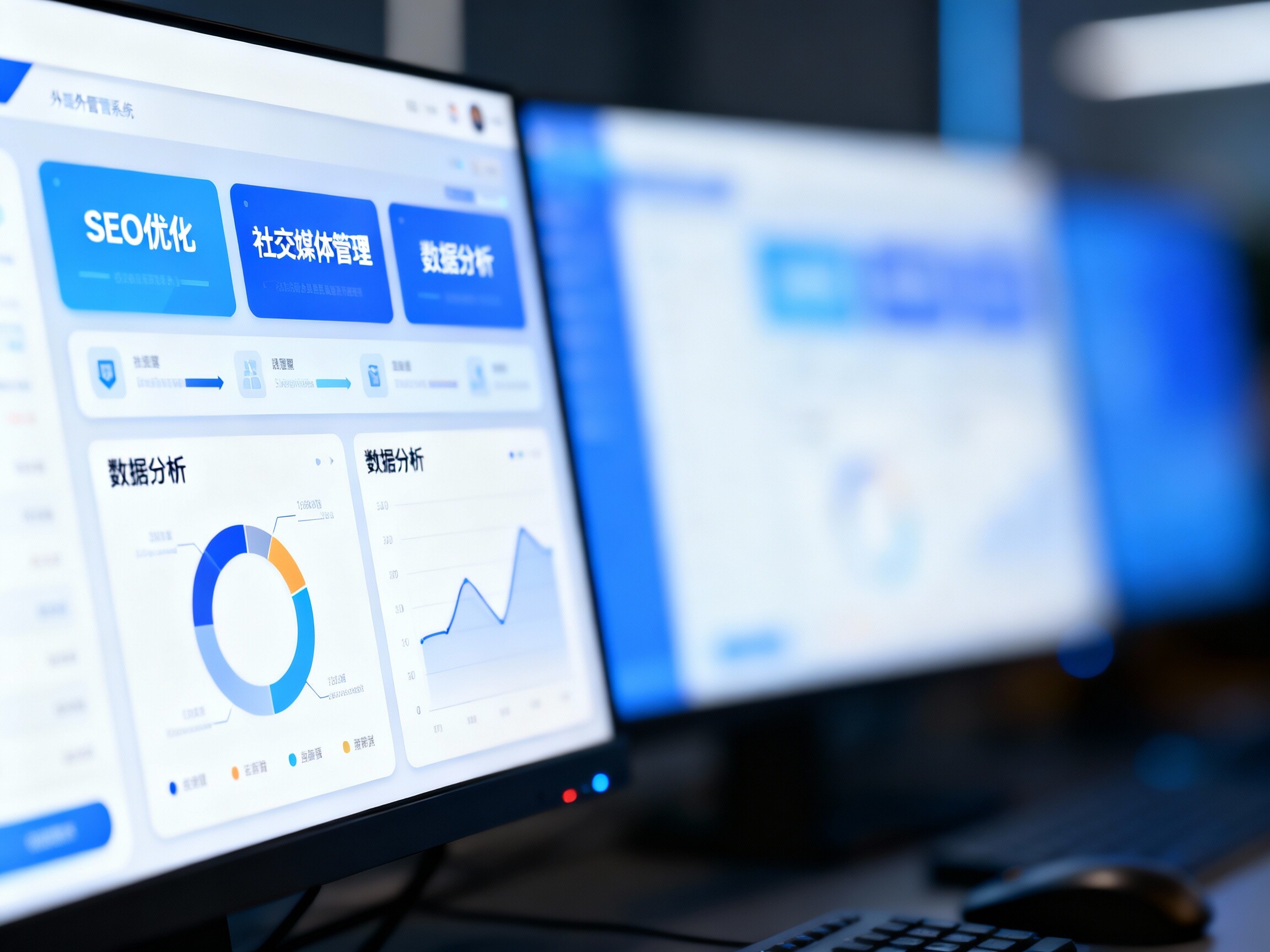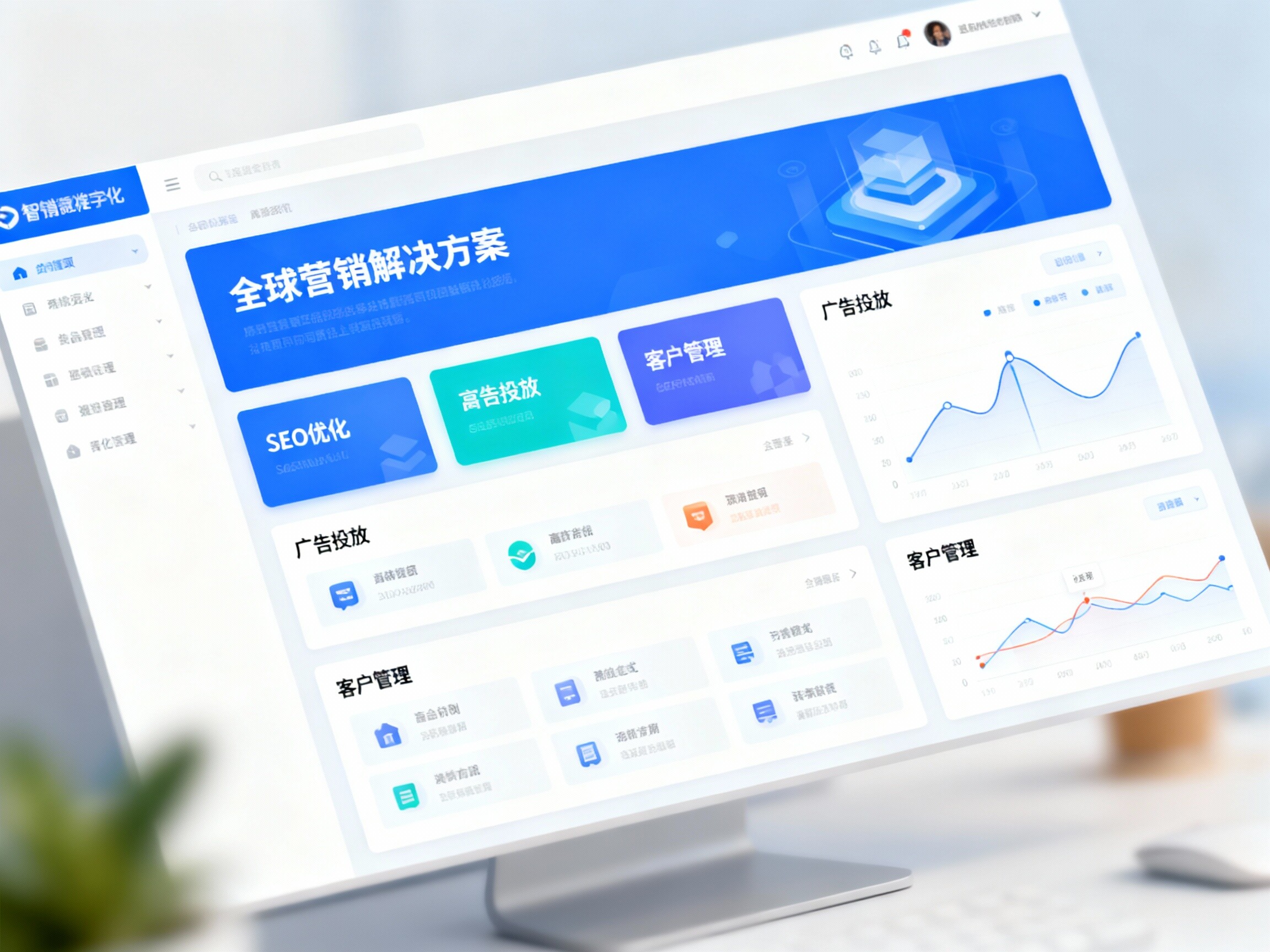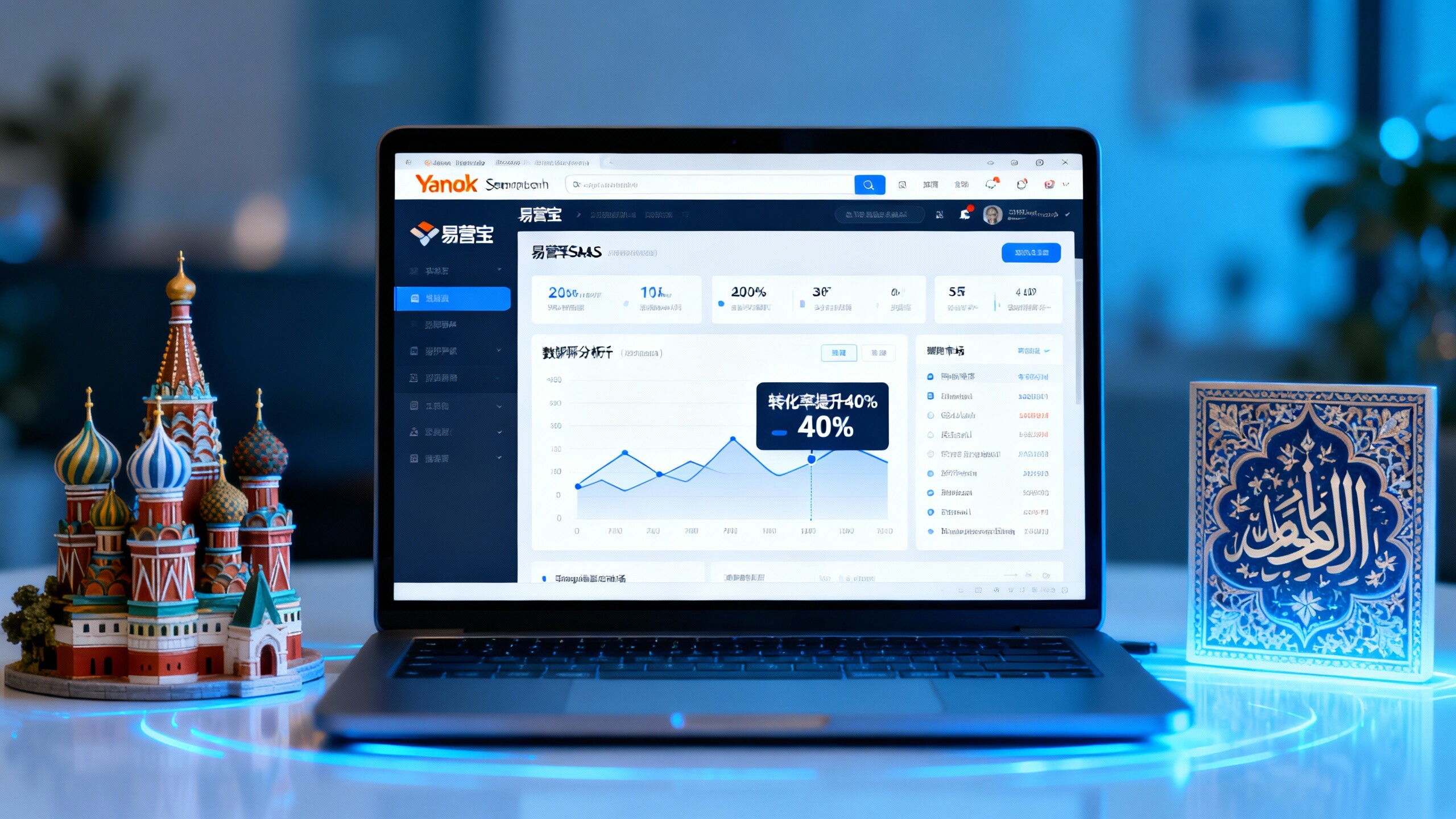I. Definition of Foreign Trade Marketing System
A foreign trade marketing system refers to an integrated digital marketing system aimed at the international market, assisting enterprises in overseas promotion, customer acquisition, brand exposure, inquiry management, and data analysis. It typically combines foreign trade website building, multilingual content management, SEO optimization, ad campaign management, customer relationship management (CRM) systems, overseas social media marketing tools, and intelligent data analytics modules to create a comprehensive global marketing ecosystem for enterprises.
The essence of this system is to help enterprises reduce promotion costs, improve inquiry quality, and quickly establish brand recognition in the highly competitive international market, thereby forming a stable source of overseas customers.
II. Development History
The emergence of foreign trade marketing systems can be traced back to the early stages of internet adoption by foreign trade enterprises. The initial marketing models primarily relied on traditional foreign trade platforms, such as international directories, B2B directories, and email blasts, which were crude methods of customer acquisition.
With the proliferation of overseas platforms like Google, Facebook, and LinkedIn, enterprises began attempting self-promotion. However, due to high technical barriers and significant execution costs, many companies struggled to sustain these efforts long-term.
About two decades ago, the first batch of foreign trade marketing management tools appeared, but their functionalities were fragmented and unable to form a unified system. Later, with the development of SaaS and AI technologies, foreign trade marketing systems entered a phase of comprehensive integration, incorporating self-built websites, SEO optimization, AI-driven automated marketing, data analytics, CRM, and other modules into a single platform, significantly reducing the difficulty of promotion for foreign trade enterprises.
Today, foreign trade marketing systems have become standard tools for enterprises expanding into global markets. They are widely used in industries such as manufacturing, cross-border e-commerce, industrial enterprises, and trading companies, serving as foundational infrastructure for driving international business growth.
III. Technical Principles

Foreign trade marketing systems operate based on a combination of multiple technologies, with core principles including the following components:
1. Multilingual Website Building and Internationalization Architecture Principles: Providing multilingual version switching, multi-domain structures, hreflang tags, global CDN acceleration, and other technologies to ensure enterprises' websites offer an international-level user experience.
2. Overseas Search Engine Optimization Principles: Enhancing natural rankings on search engines like Google through keyword placement, technical optimization, on-site structure adjustments, and content depth.
3. AI-Driven Intelligent Marketing Principles: Utilizing algorithms to analyze user behavior and recommend optimal marketing strategies, including automated emails, customer scoring, and lead tracking.
4. Social Media Integration Principles: Connecting overseas social platforms like Facebook, LinkedIn, Instagram, and TikTok via API interfaces to enable one-stop content publishing and data tracking.
5. CRM and Data Analytics Technology Principles: Implementing customer lifecycle management and precision marketing through customer profiling, behavior tracking, and analytical reports.
6. Marketing Automation Principles: Reducing labor costs and improving conversion efficiency through timed trigger marketing, scenario-based workflows, AI auto-replies, and inquiry grading mechanisms.
IV. Technical Features
Foreign trade marketing systems possess the following typical technical advantages:
1. High Integration: Combines website building, SEO, social media marketing, ad management, CRM, and AI automation within a single system.
2. Comprehensive Multilingual Support: Covers mainstream global languages, serving regions like Europe, America, the Middle East, Japan, Korea, and South America.
3. International SEO-Enhanced Structure: Fully complies with rules of search engines like Google, Bing, and Yahoo.
4. AI-Powered Recommendations: The system automatically analyzes keywords, user behavior, and inquiry quality to intelligently optimize marketing strategies.
5. Global Acceleration: Achieves sub-second international access experiences using CDN and cloud architecture.
6. Automated Marketing: Enables email follow-ups, customer scoring, inquiry reminders, and content pushes without manual intervention.
7. Security and Compliance: Meets international regulations such as GDPR, SSL, and privacy protection standards.
8. High Scalability: Supports plugins, APIs, and cross-system data integration.
V. Applications and Use Cases

Foreign trade marketing systems have broad applications, meeting the needs of various types of foreign trade enterprises, including:
1. Multilingual Foreign Trade Standalone Website Construction: Suitable for export manufacturers, trading companies, and cross-border stores.
2. Google SEO Promotion: Enhances website visibility in overseas search engines.
3. Overseas Ad Campaign Management: Unified management of Google Ads, Facebook Ads, and TikTok Ads.
4. Social Media Matrix Marketing: Supports synchronized content publishing on LinkedIn, Facebook, Pinterest, and Instagram.
5. Inquiry and Customer Management: Tracks customer behavior trajectories to enable automated follow-ups and conversions.
6. Foreign Trade Marketing Automation: Improves lead utilization efficiency through automated trigger workflows.
7. Content Marketing Management: Publishes multilingual blogs, product articles, and technical documentation.
8. Overseas Brand Promotion: Enhances international corporate image and professionalism.
VI. Comparative Analysis
To help enterprises better understand the value of foreign trade marketing systems, here is a common comparative analysis:
1. Foreign Trade Marketing System vs. Single Website System
Single website systems only provide website displays, whereas foreign trade marketing systems include off-site promotion, customer management, and intelligent marketing for full-chain functionality.
2. Foreign Trade Marketing System vs. Foreign Trade Platforms (e.g., International Directories)
Foreign trade platforms rely on platform rules for traffic, while marketing systems build independent traffic pools for enterprises, ensuring long-term stable returns.
3. Foreign Trade Marketing System vs. Traditional Manual Marketing
Traditional promotion is costly and inefficient, whereas systematic marketing offers high automation, improving lead utilization rates.
4. Self-Built Systems vs. Third-Party SaaS Systems
SaaS systems are lower-cost, faster to update, and easier to use, whereas self-built systems have higher maintenance costs.
VII. Industry Scenarios
Foreign trade marketing systems are suitable for all enterprises needing to expand into overseas markets, especially in the following industries:
1. Machinery Equipment Manufacturing
2. Foreign Trade Factories and OEM Processing Enterprises
3. Furniture, Hardware, and Building Materials Industries
4. Apparel Textiles and Packaging Industries
5. Automotive Parts and Industrial Control Industries
6. New Energy and Environmental Equipment Enterprises
7. Chemical, Plastic, and Electronic Components Industries
8. Cross-Brand Brands and Independent Store Sellers
Each industry can customize exclusive marketing strategies, content systems, and keyword matrices based on product attributes.
VIII. Certifications and Compliance Standards
Foreign trade marketing systems typically comply with the following industry standards:
1. W3C International Website Standards
2. GDPR Data Protection Standards
3. SSL Security Encryption Standards
4. ISO Translation and Content Quality Specifications
5. Multilingual Quality Assessment Standards
6. Google Lighthouse Performance Standards
7. Global CDN Acceleration Standards
8. SEO Technical Specifications, such as hreflang, structured data, and OG protocols
IX. Summary of Value and Advantages of Foreign Trade Marketing Systems
Foreign trade marketing systems are not just tools but a comprehensive global growth strategy. From multilingual website building to global exposure, from traffic acquisition to inquiry conversion, they help enterprises build independent and sustainable overseas marketing capabilities, freeing businesses from reliance on single platforms and granting autonomous traffic and long-term growth momentum.
Conclusion
Foreign trade marketing systems are core infrastructure for enterprises building global business ecosystems. In the fiercely competitive international market, enterprises with global marketing capabilities will possess stronger competitive advantages and higher brand value. By scientifically utilizing foreign trade marketing systems, enterprises can not only enhance visibility but also achieve stable global growth through intelligent means.
FAQ
1. Which enterprises are suitable for foreign trade marketing systems?
Suitable for all manufacturers, traders, and cross-border e-commerce enterprises looking to expand into global markets.
2. Does the system include multilingual functionality?
Supports global languages and can be extended to any language.
3. Is foreign trade experience required to use the system?
No, the system features intelligent optimization and automated guidance.
4. Can it improve Google rankings?
The system includes built-in international SEO engines, significantly enhancing search visibility.
5. Does it support social media operations?
Supports one-click publishing and content tracking.

Customer Reviews
"We are a machinery manufacturing enterprise. After using the foreign trade marketing system, our website traffic doubled, and inquiries from Europe and America continued to grow. The system's CRM functionality has been very helpful in managing our customers."
"The system's SEO optimization effects are very noticeable, with multiple keywords successfully ranking on Google's first page. The automated marketing features have saved us significant labor costs.
![How to Improve Conversion Rate in 3 Steps with a Foreign Trade Marketing System? Practical Case Study Revealed How to Improve Conversion Rate in 3 Steps with a Foreign Trade Marketing System? Practical Case Study Revealed]() How to Improve Conversion Rate in 3 Steps with a Foreign Trade Marketing System? Practical Case Study RevealedHow to Improve Conversion Rate in 3 Steps with a Foreign Trade Marketing System? Eyingbao SaaS Platform Combines Responsive Website System with Multilingual Website System, Revealing AI-Driven Cross-Border Website Platform Success Cases to Help Enterprises Expand Overseas Efficiently.
How to Improve Conversion Rate in 3 Steps with a Foreign Trade Marketing System? Practical Case Study RevealedHow to Improve Conversion Rate in 3 Steps with a Foreign Trade Marketing System? Eyingbao SaaS Platform Combines Responsive Website System with Multilingual Website System, Revealing AI-Driven Cross-Border Website Platform Success Cases to Help Enterprises Expand Overseas Efficiently.![How to create a multilingual website for Latin America? 3 steps to quickly enter the Mexican market How to create a multilingual website for Latin America? 3 steps to quickly enter the Mexican market]() How to create a multilingual website for Latin America? 3 steps to quickly enter the Mexican marketUtilize Eyingbao SaaS platform's multilingual website system and AI-driven foreign trade marketing system to swiftly build a responsive multilingual website for Latin America, precisely target the Mexican market, achieve localized SEO optimization and global traffic acquisition, helping businesses expand overseas efficiently.
How to create a multilingual website for Latin America? 3 steps to quickly enter the Mexican marketUtilize Eyingbao SaaS platform's multilingual website system and AI-driven foreign trade marketing system to swiftly build a responsive multilingual website for Latin America, precisely target the Mexican market, achieve localized SEO optimization and global traffic acquisition, helping businesses expand overseas efficiently.![How to Build a Foreign Trade Independent Website in 3 Steps with EasyStore SaaS Platform? How to Build a Foreign Trade Independent Website in 3 Steps with EasyStore SaaS Platform?]() How to Build a Foreign Trade Independent Website in 3 Steps with EasyStore SaaS Platform?EasyStore SaaS Platform, AI-driven website construction services empower high-conversion foreign trade independent websites. Supports Arabic website solutions, multi-language websites for Latin America, and Middle East website systems. Integrated with Yandex advertising and intelligent marketing systems, enabling rapid global expansion in 3 steps.
How to Build a Foreign Trade Independent Website in 3 Steps with EasyStore SaaS Platform?EasyStore SaaS Platform, AI-driven website construction services empower high-conversion foreign trade independent websites. Supports Arabic website solutions, multi-language websites for Latin America, and Middle East website systems. Integrated with Yandex advertising and intelligent marketing systems, enabling rapid global expansion in 3 steps.![How to Improve Conversion Rate in 3 Steps with a Foreign Trade Marketing System? Practical Case Study Revealed How to Improve Conversion Rate in 3 Steps with a Foreign Trade Marketing System? Practical Case Study Revealed]() How to Improve Conversion Rate in 3 Steps with a Foreign Trade Marketing System? Practical Case Study RevealedHow to Improve Conversion Rate in 3 Steps with a Foreign Trade Marketing System? Eyingbao SaaS Platform Combines Responsive Website System with Multilingual Website System, Revealing AI-Driven Cross-Border Website Platform Success Cases to Help Enterprises Expand Overseas Efficiently.
How to Improve Conversion Rate in 3 Steps with a Foreign Trade Marketing System? Practical Case Study RevealedHow to Improve Conversion Rate in 3 Steps with a Foreign Trade Marketing System? Eyingbao SaaS Platform Combines Responsive Website System with Multilingual Website System, Revealing AI-Driven Cross-Border Website Platform Success Cases to Help Enterprises Expand Overseas Efficiently.![Middle East Website System Comparison: Self-built vs Yisoubao - Which is Faster? Middle East Website System Comparison: Self-built vs Yisoubao - Which is Faster?]() Middle East Website System Comparison: Self-built vs Yisoubao - Which is Faster?Yisoubao SaaS Platform vs Self-built Website: Which is Faster? Revealing How AI-Driven Website Construction Services Help Foreign Trade Independent Sites Efficiently Deploy in the Middle East and Latin American Markets, Supporting Arabic Website Construction Solutions, Multilingual SEO and Yandex Promotion, 72-Hour Rapid Launch, Boosting Conversion Rates by 200%.
Middle East Website System Comparison: Self-built vs Yisoubao - Which is Faster?Yisoubao SaaS Platform vs Self-built Website: Which is Faster? Revealing How AI-Driven Website Construction Services Help Foreign Trade Independent Sites Efficiently Deploy in the Middle East and Latin American Markets, Supporting Arabic Website Construction Solutions, Multilingual SEO and Yandex Promotion, 72-Hour Rapid Launch, Boosting Conversion Rates by 200%.![Having trouble with Yandex promotion? Using EasyStore for independent websites doubles the success rate Having trouble with Yandex promotion? Using EasyStore for independent websites doubles the success rate]() Having trouble with Yandex promotion? Using EasyStore for independent websites doubles the success rateEasyStore SaaS platform helps foreign trade independent websites efficiently acquire customers, AI-driven website construction services + Yandex promotion optimization, enhancing conversion in Middle Eastern and Latin American markets. Supports Arabic website construction solutions and multilingual website systems, achieving high-conversion marketing closed-loop. Click to learn about the solution!
Having trouble with Yandex promotion? Using EasyStore for independent websites doubles the success rateEasyStore SaaS platform helps foreign trade independent websites efficiently acquire customers, AI-driven website construction services + Yandex promotion optimization, enhancing conversion in Middle Eastern and Latin American markets. Supports Arabic website construction solutions and multilingual website systems, achieving high-conversion marketing closed-loop. Click to learn about the solution!![Why isn't your foreign trade marketing system conversion rate improving? Why isn't your foreign trade marketing system conversion rate improving?]() Why isn't your foreign trade marketing system conversion rate improving?EasyTrade SaaS platform, AI-driven high-conversion independent foreign trade website building, intelligent optimization of multilingual websites and Yandex promotion, enhancing conversion rates in Middle Eastern and Latin American markets, making foreign trade marketing systems truly efficient.
Why isn't your foreign trade marketing system conversion rate improving?EasyTrade SaaS platform, AI-driven high-conversion independent foreign trade website building, intelligent optimization of multilingual websites and Yandex promotion, enhancing conversion rates in Middle Eastern and Latin American markets, making foreign trade marketing systems truly efficient.![How to create a multilingual website for Latin America? Avoid these 3 pitfalls at all costs How to create a multilingual website for Latin America? Avoid these 3 pitfalls at all costs]() How to create a multilingual website for Latin America? Avoid these 3 pitfalls at all costsEasypack SaaS platform helps build multilingual websites for Latin America, steering clear of three major pitfalls! AI-powered high-conversion foreign trade independent websites with multilingual SEO, Yandex promotion, and localized marketing to enhance overseas lead generation efficiency.
How to create a multilingual website for Latin America? Avoid these 3 pitfalls at all costsEasypack SaaS platform helps build multilingual websites for Latin America, steering clear of three major pitfalls! AI-powered high-conversion foreign trade independent websites with multilingual SEO, Yandex promotion, and localized marketing to enhance overseas lead generation efficiency.










